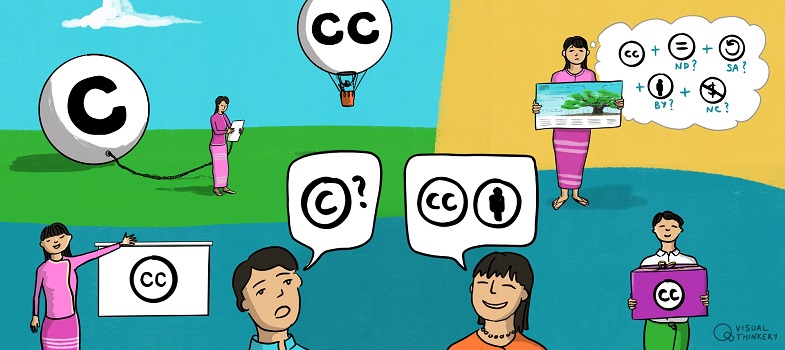Questions about open licences
Here’s some common questions about CC licences, and their answers. You can find more questions and answers about CC licences in the frequently asked questions section of the Creative Commons website.
Can I customise a CC licence?
One of the most important aspects of Creative Commons licences is that they are standardised, meaning that the terms and conditions are the same for all works subject to the same type of CC licence. This makes it much easier for the public to understand how the licences work and what reusers have to do to meet their obligations.
But CC licences do not apply to works in a vacuum. CC-licensed works usually live on websites that have their own terms of service. Sometimes, they are not in formats that make it easy to reuse or adapt them. And the works are often available in hard copy form for a price.
But people and institutions who use the licences have diverse needs and wants. Sometimes creators want slightly different terms rather than the standard terms that CC licences offer.
We strongly discourage people from customising open copyright licences, because it:
- creates confusion
- requires users to take the time to learn about how the custom licence differs
- eliminates the benefits of standardisation.
If you change any of the terms and conditions of a CC licence, you cannot call it a Creative Commons licence or otherwise use the CC trademarks. This rule also applies if you try to add restrictions on what people can do with CC-licensed work through your separate agreements, such as a website’s terms of service. For example, your website’s terms of service can’t tell people that they can’t copy a CC-licensed work (if they are complying with the licence terms). You can, however, make your CC-licensed work available on more permissive terms and still call it a CC licence – for example, you may waive your right to receive attribution.
Creative Commons has a detailed legal policy outlining these rules, but the best way to apply them is to ask yourself whether what you want to do will make it easier or harder for people to use your CC-licensed work. If the latter, generally it’s a restriction and you can’t do it – unless you remove the Creative Commons name from the work.
Note that all of the above applies to creators of CC-licensed work. You can never change the legal terms that apply to someone else’s CC-licensed work.
Can I sell a CC-licensed work?
If you are the creator, then selling your work is always okay. In fact, selling physical copies (such as a textbook) and providing digital copies for free is a very common method for making money while using CC licences. For, example OpenStax textbooks are available at no cost on their website, but the hard copies are sold for around US$40.
Charging for access to digital copies of a CC-licensed work is more difficult. It is permissible, but once someone pays for a copy of your work, they can legally distribute it to others for free under the terms of the applicable CC licence.
If you are charging for access to someone else’s CC-licensed work – whether a physical copy or digital version – you have to pay attention to the particular CC licence applied to the work. If the CC licence includes the NonCommercial (NC) restriction, then you cannot charge the public to access the work.
What if you change your mind about the CC licence?
Inevitably, there are creators who apply a CC licence to a work and then later decide they want to offer it on different terms. Even though the original licence cannot be revoked, the creator is free to:
- also offer the work under a different licence
- remove the copy of the work that they placed online.
In those cases, anyone who finds the work under the original licence is legally permitted to use it under those terms until the copyright expires. As a practical matter, reusers may want to comply with the creator’s new wishes as a matter of respect.
What if someone does something with my CC-licensed work that I don’t like?
As long as users abide by licence terms and conditions, authors/licensors cannot control how their material is used. That said, all CC licences provide several mechanisms that allow licensors to choose not to be associated with their material, or to use of their material that they disagree with:
- All CC licences prohibit using the attribution requirement to suggest that the licensor endorses or supports a particular use.
- Licensors may waive the attribution requirement, choosing not to be identified as the licensor, if they wish.
- If the licensor does not like how the material has been modified or used, CC licences require the licensee to remove the attribution information upon request. (In version 3.0 and earlier, this is only a requirement for adaptations and collections; in version 4.0, this also applies to the unmodified work.)
- Finally, anyone modifying licensed material must indicate that the original has been modified. This ensures that changes made to the original material – regardless of whether the licensor approves of them – are not attributed back to the licensor.
Further, it is important to remember that:
- there is not much ‘abuse’ of openly licensed works – most users of CC-licensed work are responsible and abide by the relevant licensing terms
- copyright and/or open copyright licences doesn’t keep ‘bad’ people from doing ‘bad’ things with your work if they don’t care about copyright.
Introduction
